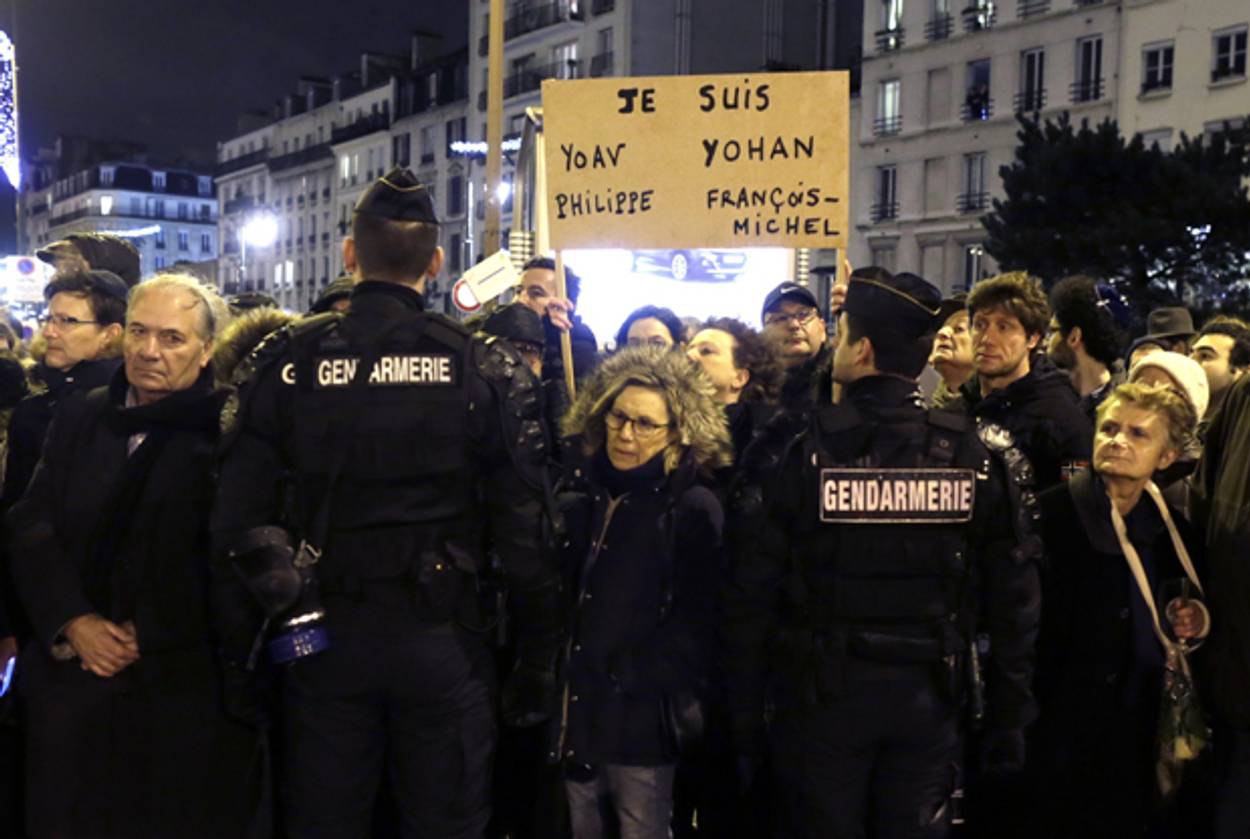A New Reality for Young Jews in Europe
Reflections from the president of the European Union of Jewish Students




In May 2014, my colleague Andi Gergely and I spoke to Tablet about how it was not “all doom and gloom” for Jews in Europe—despite having just learned the outcomes of the European Parliament elections, which saw extreme parties gain further momentum, and grieving for the victims of the terror attack on the Brussels Jewish Museum. As leaders of the World Union of Jewish Students and the European Union of Jewish Students, respectively, we spoke about the projects we saw spring up in small Jewish communities, and the interest of many in discovering Europe’s rich Jewish heritage. We described a budding Jewish confidence in Central Europe. I also mentioned, however, that amongst Jewish student leaders, opinions were split about where they’d build their futures.
But then the attacks on Charlie Hebdo and the Hyper Cacher kosher supermarket happened. And it feels like this time, something’s different. The attack on Charlie Hebdo was a profound shock for Europeans. I had seen a Charlie Hebdo cartoon or two over the years—I had friends who read it—but had always cringed a little at their crude depictions. Only now did I come to understand what an institution it represents to many French people. “They make fun of everyone, They are like children! Which is why we love them,” explained one friend. I was struck by how many people seemed to identify with what the magazine stood for—something difficult to grasp for the non-French—and how they placed it right next to the loud, public rally as an essential part of French political culture.
Two days after the Charlie Hebdo attack, I met with members of a partner organization that specializes in anti-discrimination training to discuss a joint project, but we couldn’t really bring ourselves to work. We stared into our coffee cups, attempting to gauge just how much more difficult our work had become in a Europe that was afraid of and tempted by all kinds of radical and extreme thinking. And then, the second awful shock hit as we learned a gunman had taken hostages at a kosher supermarket. Once more, Jews were made the object of radical Islamism’s barbarism. And in that moment, it was nearly impossible to keep despair at bay. Toulouse, Brussels, Paris. Where does one even begin? What can one possibly do?
As the community collectively began to piece itself back together over Shabbat and at the unity march in Paris on Sunday, my colleagues in Jewish communities and organizations started to seek action. If they weren’t already fluent, they began educating themselves in policy matters regarding counter-terrorism, deradicalization, and prevention. Plans are being scaled up, the urgency of Europe’s crisis now clear to everyone. There is a sense of tachles, or purpose, in the air: We need to take decisive action against radical Islamism now. We are trying to raise awareness of how immediate the threat is to Jews in particular. And governments do recognize that—French Prime Minister Manuel Valls’ strong speech denouncing the new anti-Semitism in front of the National Assembly and his subsequent action to protect Jews is a testament to this.
My daily life has changed since the attacks, and will most likely remain impacted for a while. I once again made the decision to evacuate the European Union of Jewish Students office for security reasons, which I had last done after the Brussels attack. I am even considering moving the office altogether. As I’m typing this, raids on terror cells are taking place all over Belgium and Jewish schools have closed down. Other Western European communities have raised their security levels as well.
So how do I feel about Jewish future today? I am concerned. I believe these next couple of months, if not years, will be difficult. I am not only concerned as a Jew, but also as a European. And this is where things feel different this time around. We are all living the same nightmare, and will hopefully share the quest for solutions, without sliding into radicalisms of our own.
But all this being said, I haven’t lose sight of the wonderful things about Jewish life here in Europe. Organizing our annual Summer University, a week-long event for 400 Jewish students from across Europe, is more important now than ever. It represents our care, joy, and dedication to Judaism and the Jewish people. While we are certainly acutely aware of the situation in Western Europe, we also keep other communities in mind. That was my main message in last year’s podcast, and it remains the same: Remember to also see the positive, funny, and heartwarming aspects of Jewish life in Europe. It will comfort you as it comforts me.
Jane Braden-Golay is president of the European Union of Jewish Students.
Jane Braden-Golay is president of the European Union of Jewish Students.